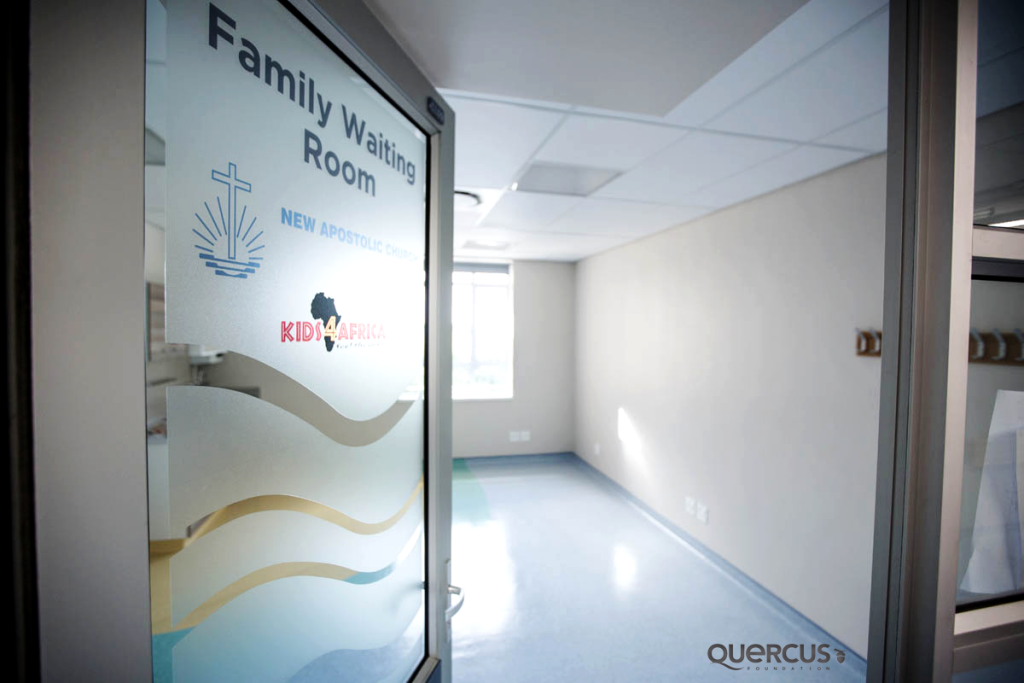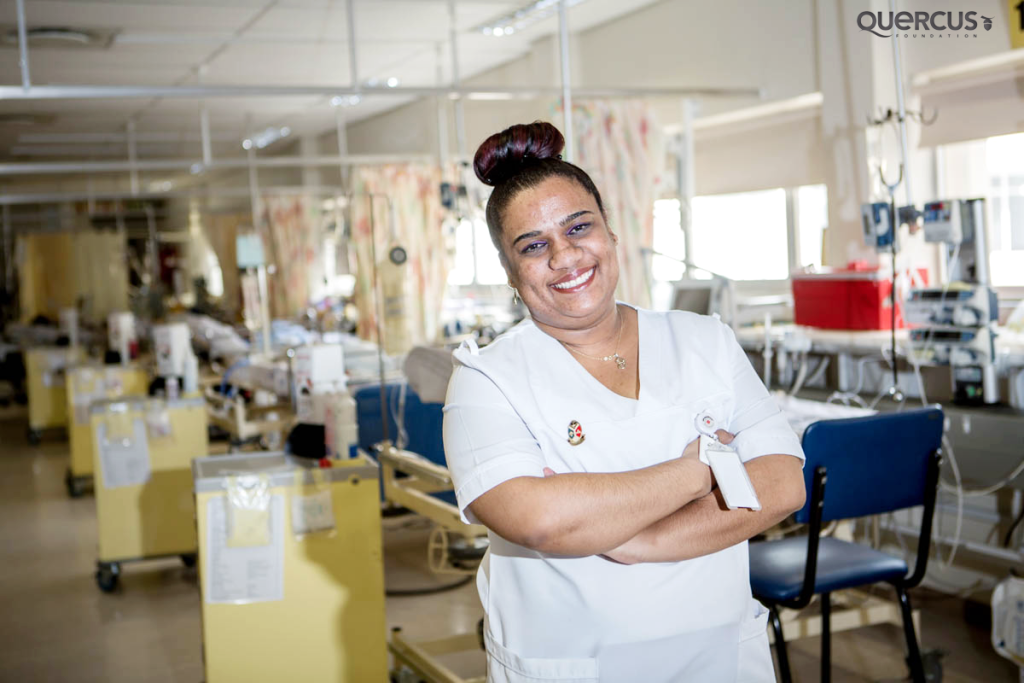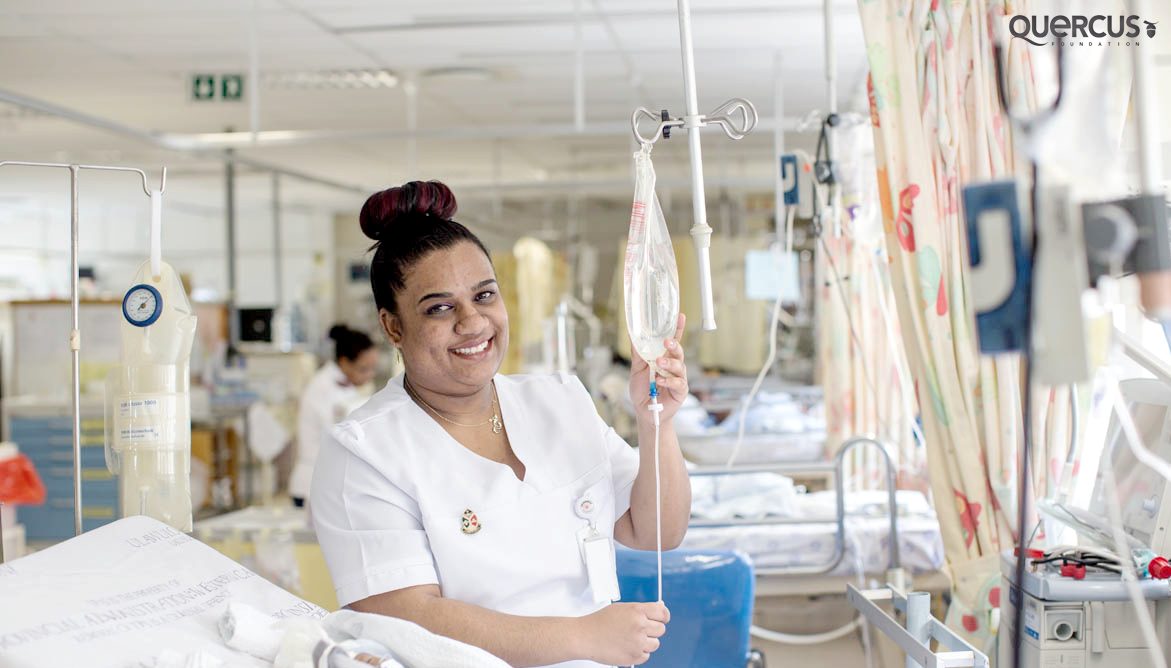
PICU Upgrade and expansion: Interview with nurse Shaheeda Juel
June 30, 2016 | By Toni Calliva
Nurse, Shaheeda Juel talks construction, patient care and the importance of isolation units with Quercus Foundation during our recent visit to the Red Cross War Memorial Children’s Hospital (RCWMCH) in Cape Town, South Africa. Juel is a professional nurse in their Paediatric Intensive Care Unit (PICU).
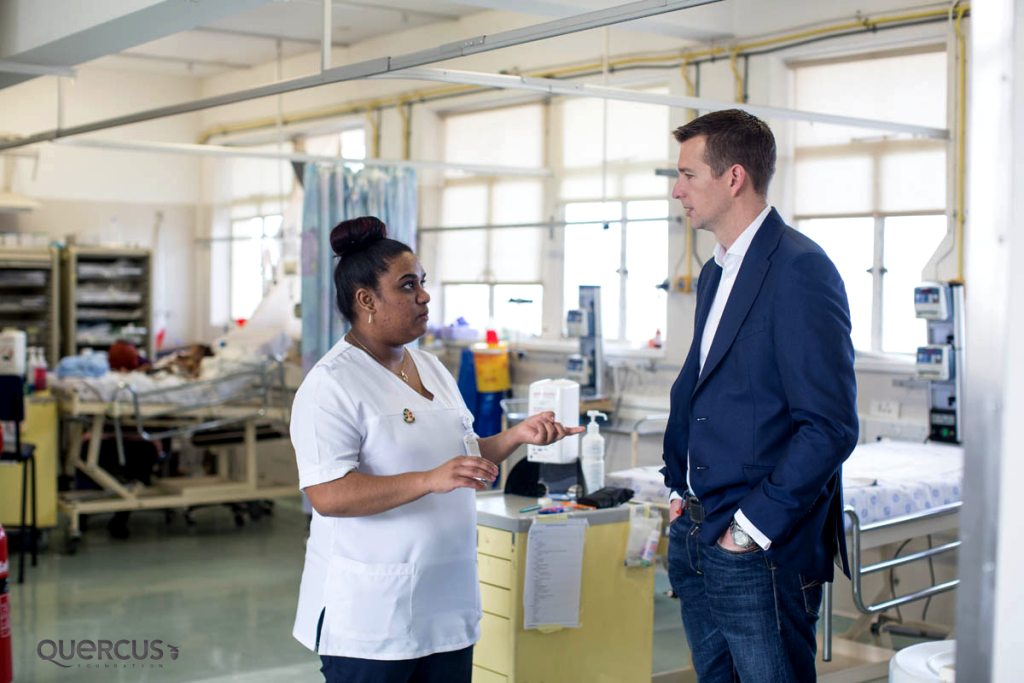
Nurse, Shaheeda Juel talks to Quercus Foundation’s Finance Manager, Bruce Smith during a recent PICU hospital tour at the Red Cross War Memorial Children’s Hospital in Cape Town, South Africa. She explains the staff’s concerns around pneumonia cases as their winter season fast approaches. Many of the children that the RCWMCH treat come from areas of extreme poverty where they lack the basic needs, such as toilets and clean running water. Photo Credit: Karin Schermbrucker, Slingshot Media.
On becoming a nurse
I always had a love for children! I applied for teaching and nursing. I got into both, then I thought, “let me rather go into nursing”. I went to Nico Malan (nursing college) and the first year we got to work in the ‘B wards’ with patients and I loved it. You get to work one on one with the babies and no matter how sick the babies are, if you play with them they smile and that just makes your day go better, no matter how bad it is, if you get that smile – you brighten up! That child doesn’t understand that he is sick, but he get’s that you’re playing with him, so automatically you are brightening his day up also. That was my motivation for me to be where I want to be, especially with kids.
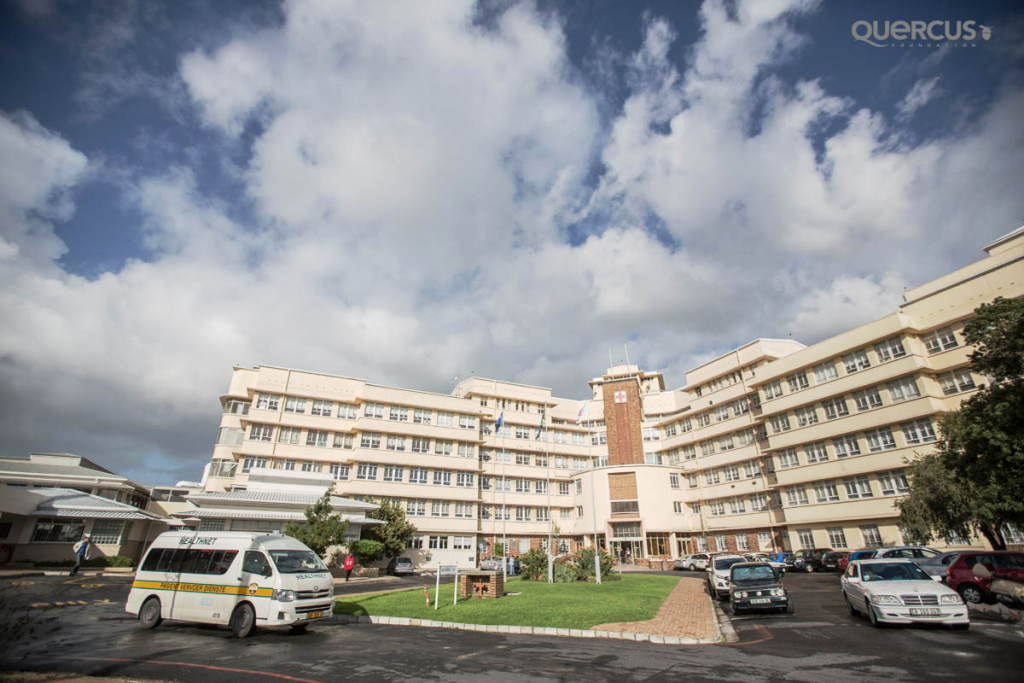
The Red Cross War Memorial Children’s Hospital in Cape Town, South Africa is one of the leading children’s Hospitals in the world. Not only does the hospital provide world class treatment to seriously ill children, but also carries out high level medical training both locally and internationally and conducts ground breaking research into childhood illnesses which has global influence. Photo Credit: Karin Schermbrucker, Slingshot Media.
On RCWMCH and the PICU
When I finished my training I was praying, “ Just please Lord put me by Red Cross.”
And then I got in. [Emotional ‘yes’.]
This is my second year! Last year I did my ComServe (training). I tried to work hard, because I needed a challenge. They asked me in what department I would like to work, so I said “ICU”. I felt I needed the training as it is only going to increase my knowledge of the field. Still to date I don’t know everything, but there’s always someone you can ask, you know, “What do you need? Where?”- you see you have that support. I was so happy when I came here (PICU), because there are mentors here and it feels like a family.
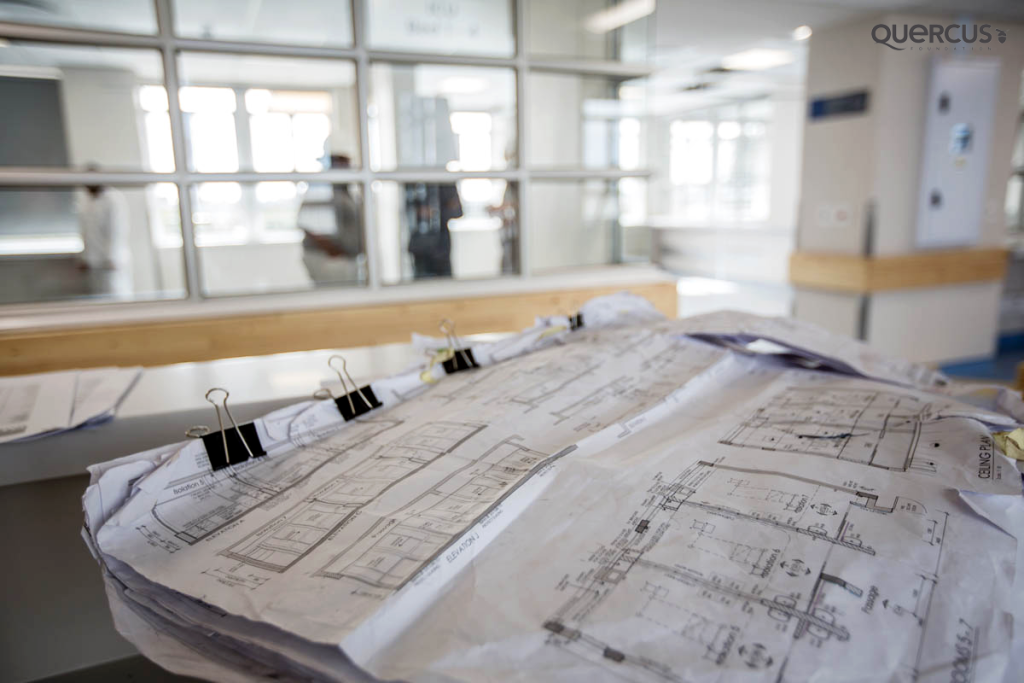
PICU upgrade and expansion: Phase 1 of construction now complete. Photo Credit: Karin Schermbrucker, Slingshot Media.
On why the PICU upgrade is so important
Patient care, it’s always about patient care. At the moment we’re trying to give the best quality (care) to patients, but a bigger ICU means better isolation and then we can look after the patients better. I feel at the moment we are giving it, but a new ICU with better equipment, would make it even better for the patients.
What challenges you are facing with the upgrade?
The noise levels, but we are working on that. In the beginning the noise was quite intense. When you would come in you would smell the burning smell from the grinders and the dust would be settling. Most of us have sinuses so dust also irritated us. We learnt to adapt and come to work with our sinus spray, but now as the renovations have gone on it has cleared up. You don’t want to stay absent, because who is going to look after your patient you are allocated to look after and that you are responsible for.
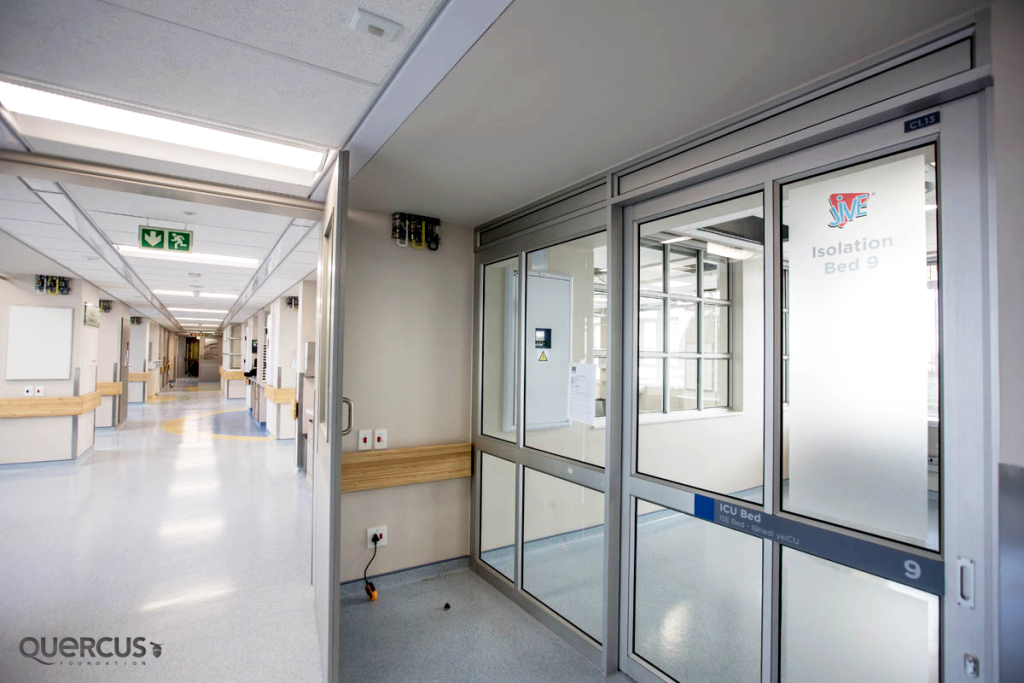
Phase 1 of construction, at the Red Cross War Memorial Children’s Hospital, Cape Town, South Africa, is now complete and includes the creation of much needed Isolation facilities within the PICU. It protects patients from cross infection, particularly those children who are contagious or have a low immune system. Photo Credit: Karin Schermbrucker, Slingshot Media.
On the importance of having isolation units
At the moment there are no isolation units.
Maybe a child comes in with TB and is laying next to a child that has pneumonia. His lungs are already weak and now there is a child with TB (or some other acquired airborne disease), so the chances of him getting it are high. With a new ICU we can put the patient (with the airborne disease) into the isolation unit and nurse it without worrying about your other patient becoming sick. It just makes it much better for the survival of the patients. You always need to consider the patients first and with the new PICU, that will limit our worry. It will make our job a little bit easier.
How you are you caring for children that need isolation at the moment, especially with the construction going on?
So what we try to do, and I know it’s not always practical, but we would put the patient at the back of the old ICU, so there won’t be a patient (with an airborne disease) next to another patient (with a compromised immune system). We try to keep a bed open (for children with contagious diseases) to limit the exposure to other patients. You will know automatically with that one you must wear your mask and apron, because of the airborne disease.
Disadvantage – is now you have a bed standing open, which another child could need.
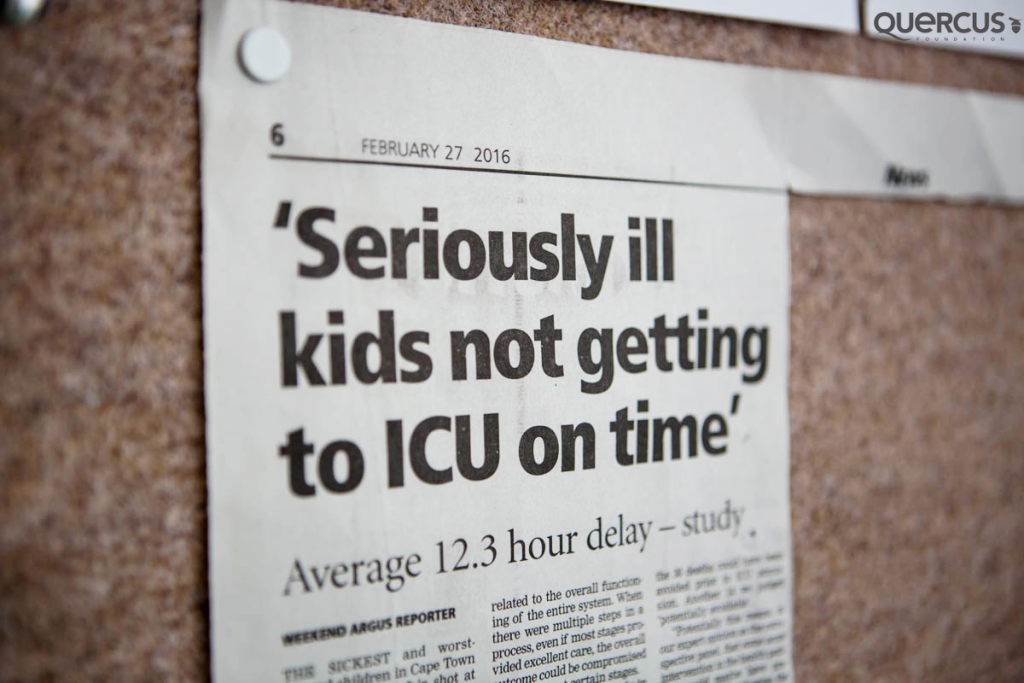
The demand for a bed at the RCWMCH has reached a point where at least 55 children a year have had their scheduled surgeries cancelled a result of the shortage of space. Photo credit: Karin Schermbrucker, Slingshot Media.
On what makes the RCWMCH so special
It’s a children’s hospital that tends to children’s needs. You’ve got the “Friends” (FOCHA – Friends of the Children’s Hospital Association – Volunteers) that come and play with the children.
You don’t see that in big hospitals, the support and the love.
It might not be your child, but it’s someone’s child and they show that love and care for each patient.
On working with other nurses and the team/family environment
I think that is what made me love to work for the Red Cross, because I’ve worked all over, in other general hospitals, but here is where I felt the support and the guidance.
It’s one on one, it’s not “I am the nurse, you are the doctor, you working different” – here, everyone is working in the same direction to get to the same goal. I think that is what everyone needs to feel.
It makes your day better! You don’t come to work, feeling “Urgh, now I have to work”, instead you are rushing, “What are we going to do at work today, let’s get to work.”
It’s because you wake up in a positive mind set. Sick children come in here, so if you are in a positive mind set it doesn’t matter how hectic it gets, it’s still a nice day, it’s a learning day and the children survive. That is the final thing, because when you come in here you want them to be healthy and go on. Like, you are nursing for a while, and you see how sick (the children) are when they come in, and then when they leave they are smiling – that is what you basically want.
That is supposed to be your goal – to nurse them to the point where they leave and mommy and daddy thank you.
You give them an opportunity at childhood
Yes!! [Very excited laughter]
If I have a minute or so I will go down to the wards to see them (the children). They come in here (PICU) ventilated and sedated, so you don’t know the type of person they are. When you go to the wards, you see that you had a part in helping that child. They’re playing and they’re running around and it just makes you feel a bit better. You know you did something good for that child.
[It is very rewarding] It is…
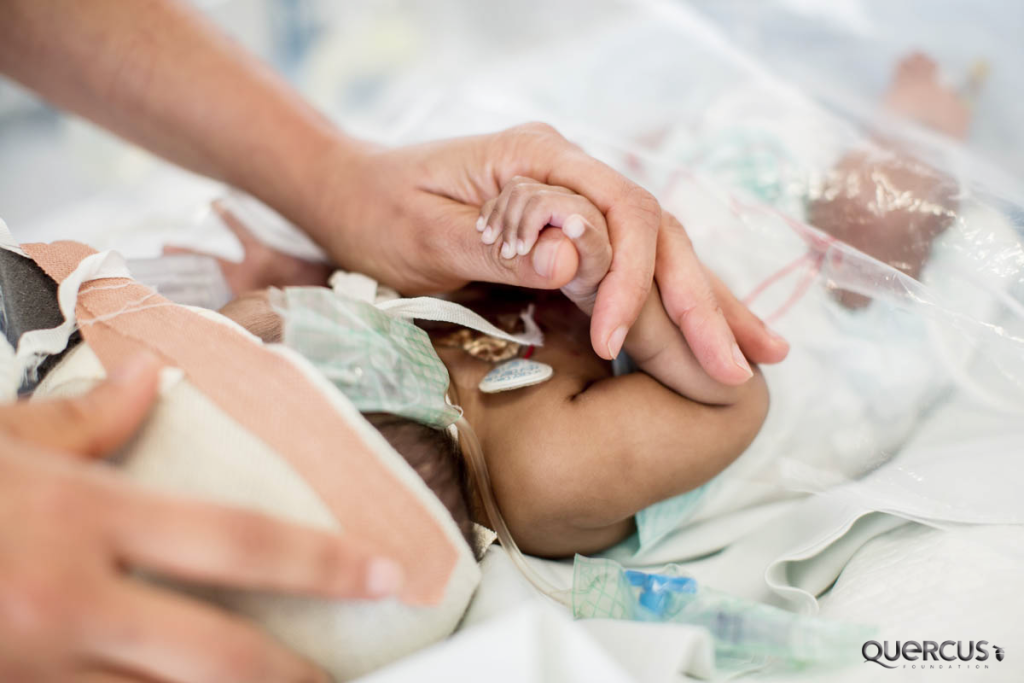
Nurse with patient in the Paediatric Intensive Care Unit (PICU) at the Red Cross War Memorial Children’s Hospital, Cape Town, South Africa. Photo Credit: Karin Schermbrucker, Slingshot Media.
What is the direct benefit of the PICU upgrade for the nurses?
I think the main thing for us, at the moment, is better equipment to help the children. Yes, there is going to be space for us, but in the end we are not here for space, we are here for the patients.
I heard, which I am really looking forward to, is that there is going to be a ‘quiet room‘.
So even though your day is getting hectic, if you’re feeling like you need five minutes, then you can tell yourself, or the sister you are reporting to, “Look here, I am just having a moment, can I just spend five minutes in the quiet room.” [Do you have a place to do that now?] No, not at the moment. If we need a minute then we maybe come to the kitchen or maybe tell them, “Look here, I just need to get some fresh air.” Because sometimes the children do come in here in a bad state and it does get to you, because you are human.
But, at the moment we don’t have a quiet space. You can see by where we are standing and doing the interview, so there isn’t that. But I think it’s going to be better for us.
Say we want to de-stress, you get that case where the child you put everything into then doesn’t make it, it breaks you. You need to be strong again, because the next patient is on his way again. It (the upgrade) is going to give us also the freedom, even if we are frustrated, to go to a quiet room, so you can go scream and get the frustration out and get back to your job.
On bereavement rooms
At the moment we don’t even have a bereavement room. If you need to give parents or family members bad news, you want to have a nice place, you know, where it feels homely, so if you’re going to deliver bad news they’re in a safe zone. But at the moment we can’t deliver that, because there is no space.
You must be so excited for the upgrade?
I am, I think I am a bit too excited sometimes! (laughter). This is the one choice I didn’t regret, I made the choice to come into the PICU to work here, so everyday for me, if I did something to make children’s lives better – then I did my job. That’s why I try to be positive and just enjoy my work.


